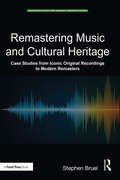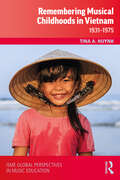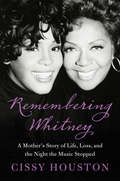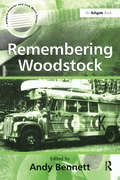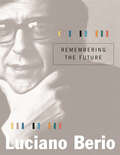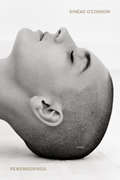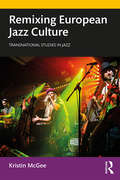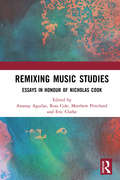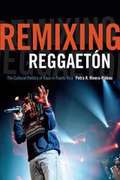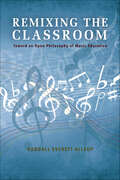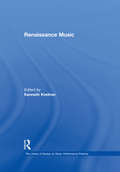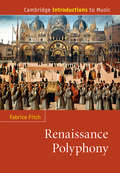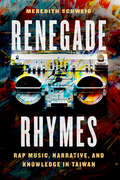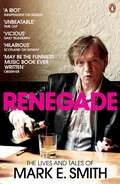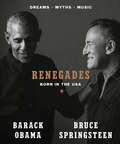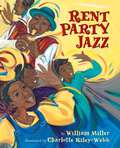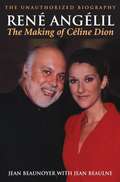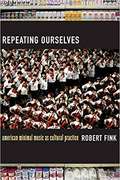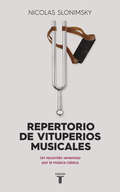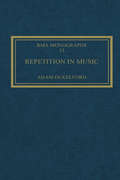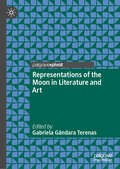- Table View
- List View
Remastering Music and Cultural Heritage: Case Studies from Iconic Original Recordings to Modern Remasters (Perspectives on Music Production)
by Stephen BruelRemastering Music and Cultural Heritage presents a detailed account of the culture and practice of remastering music recordings. By investigating the production processes and the social, nostalgic and technological components of remastering practice, the book demonstrates the application of these techniques to iconic recordings by artists including The Beatles, Elton John and Oasis. Through comprehensive interviews with music production professionals directly involved in both the original productions and remastered releases of these iconic recordings – and detailed digital audio analysis – this book offers an extensive insight into music production and remastering practice. Readers learn about the music production techniques behind creating some of the most well-recognised and loved albums of all time, as well as the processes used to create the remasters, to help guide their own projects. Remastering Music and Cultural Heritage is essential reading for students and teachers of music production, professional practitioners and musicians.
Remembering Musical Childhoods in Vietnam: 1931-1975 (ISME Series in Music Education)
by Tina A. HuynhThis book offers an in-depth exploration of the childhood musical experiences of Vietnamese elders, providing a unique lens on the intersections between identity, culture, and music education. Centering the stories of five Vietnamese Americans and one Vietnamese person who grew up in Vietnam between 1931 and 1975, the author considers the role that each individual’s childhood musical experiences played in their life as they were impacted by war, political movements, and immigrant and refugee experiences. The book adds a new perspective to research on the global music practices of children by exploring music transmission and repertoire in Vietnam in the context of political unrest and colonialism before and during the Vietnam War. It also explores the evolution of the personal meanings and memories of music over a period of drastic change in each individual’s life, as five of six elders transitioned into a life in the United States.This book provides both an act of cultural and musical preservation, and relevant implications for music education today. Situating the children’s songs and games of Vietnamese culture in their original context, the author invites those in the field of music education to consider how lived experiences and entrenched systems of teaching affect music learning and identity formation. The volume includes a selection of Vietnamese children’s songs, games, chants, and musicopoetic lullabies (ca dao), offering ways to enrich music educators’ world music curricula. Relevant to music education, ethnomusicology, and Asian American studies, this book provides a nuanced account of Vietnamese children’s music making of the past and presents an analysis of childhood musical experiences in a wider cultural, sociopolitical, and historical context.
Remembering Whitney: A Mother's Story of Life, Loss, and the Night the Music Stopped
by Lisa Dickey Cissy HoustonHouston promises to discuss forthrightly the high points and low dives in her daughters personal and professional lives while reminding us that when Whitney died, "the world lost one of the most beautiful voices and an extraordinarily beautiful and charitable woman. "
Remembering Woodstock (Ashgate Popular and Folk Music Series)
by Andy BennettThe Woodstock festival of 1969, which featured such groups and artists as the Who, Country Joe and the Fish, Ten Years After, Janis Joplin and Jimi Hendrix, is remembered as much for its 'bringing together' of the counter-cultural generation as for the music performed. The event represented a milestone in the use of music as a medium for political expression while simultaneously acting as a springboard for the more expressly commercial of rock and pop events which were to follow. In the thirty years since the festival took place, Woodstock has become the subject of many books, magazine articles and documentaries which have served to mythologise the event in the public imagination. These different aspects of the Woodstock festival will be discussed in this wide ranging book which brings together a number of established and new writers in the fields of sociology, media studies and popular music studies. Each of the five chapters which will focus on a specific aspect of the Woodstock festival and its continuing significance in relation to the music industry, the rock festival 'tradition', sixties nostalgia and the cultural impact of popular music.
Remembering the Future (The Charles Eliot Norton lectures)
by Luciano BerioHow one of the foremost experimental composers of the twentieth century approaches his métier.Music is never confined to a single moment. Compositions play with our expectations of the future; musical notes are recorded on a page to be revived by future performers; and old compositions are remembered, quoted, and reconfigured in new ones. In his 1993–1994 Charles Eliot Norton Lectures, Luciano Berio skillfully explores the whirlpools and eddies of musical time, the intricate interplay between our moment-to-moment experience of music and the idioms, traditions, and histories that form our musical memory.Remembering the Future is full of insights into Berio’s own creative process. Writing these lectures, he says, “led me to formulate thoughts that might otherwise have remained concealed in the folds of my work.” Thematically wide-ranging—reflecting on transcription and translation, poetics and analysis, opera and the “open work”—Berio offers a trenchant assessment of both his contemporaries and his forbears, from Boethius to Boulez. Like his friend and sometime collaborator Umberto Eco, he was also a figure of formidable intellect, fluently engaging with Heinrich Schenker, Theodor Adorno, Walter Benjamin, Carl Dahlhaus, and other critical luminaries.But Berio wears his learning lightly. The cerebral complexity of these lectures is leavened with irony, humor, and arresting aphorisms. Ultimately, he points us back to the music: “The best possible commentary on a symphony,” Berio says, “is another symphony.”
Rememberings
by Sinéad O'ConnorFrom the acclaimed, controversial singer-songwriter Sinéad O’Connor comes a revelatory memoir of her fraught childhood, musical triumphs, fearless activism, and of the enduring power of song. Blessed with a singular voice and a fiery temperament, Sinéad O’Connor rose to massive fame in the late 1980s and 1990s with a string of gold records. By the time she was twenty, she was world famous—living a rock star life out loud. <P><P> From her trademark shaved head to her 1992 appearance on Saturday Night Live when she tore up Pope John Paul II’s photograph, Sinéad has fascinated and outraged millions. <P><P>In Rememberings, O’Connor recounts her painful tale of growing up in Dublin in a dysfunctional, abusive household. Inspired by a brother’s Bob Dylan records, she escaped into music. She relates her early forays with local Irish bands; we see Sinéad completing her first album while eight months pregnant, hanging with Rastas in the East Village, and soaring to unimaginable popularity with her cover of Prince’s “Nothing Compares 2U.” <P><P> Intimate, replete with candid anecdotes and told in a singular form true to her unconventional career, Sinéad’s memoir is a remarkable chronicle of an enduring and influential artist. <P><P><b>A New York Times Bestseller</b>
Remixing European Jazz Culture
by Kristin McGeeRemixing European Jazz Culture examines a jazz culture that emerged in the 1990s in cosmopolitan cities like Amsterdam, Rotterdam, Berlin, London, and Oslo – energised by the introduction of studio technologies into the live performance space, which has since developed into internationally recognised, eclectic, hybrid jazz styles. This book explores these oft-overlooked musicians and their forms that have nonetheless expanded the plane of jazz’s continued prosperity, popularity, and revitalisation in the twenty-first century – one where remix is no longer the sole domain of studio producers. Seeking to update the orthodoxies of the field of jazz studies, Remixing European Jazz Culture: incorporates electronic and digital performance, recording, and distribution practices that have transformed the culture since the 1980s; provides a more diverse and multifaceted cultural representation of European jazz and the contributions of a variety of performers; and offers an encompassing picture of the depth of jazz practice that has erupted through Northern Europe since 1989. With an expansion of international networks and a disintegration of artistic boundaries, the collaborative, performative, and real-time improvisational process of remixing has stimulated a merging of the music’s past and present within European jazz culture.
Remixing Music Studies: Essays in Honour of Nicholas Cook
by Eric Clarke Ananay Aguilar Ross Cole Matthew PritchardWhere is the academic study of music today, and what paths should it take into the future? Should we be looking at how music relates to society and constructs meaning through it, rather than how it transcends the social? Can we ‘remix’ our discipline and attempt to address all musics on an equal basis, without splitting ourselves in advance into subgroups of ‘musicologists’, ‘theorists’, and ‘ethnomusicologists’? These are some of the crucial issues that Nicholas Cook has raised since he emerged in the 1990s as one of the UK’s leading and most widely read voices in critical musicology. In this book, collaborators and former students of Cook pursue these questions and others raised by his work—from notation, historiography, and performance to the place of music in multimedia forms such as virtual reality and video games, analysing both how it can bring people together and the ways in which it has failed to do so.
Remixing Reggaetón: The Cultural Politics of Race in Puerto Rico
by Petra R. Rivera-RideauPuerto Rico is often depicted as a "racial democracy" in which a history of race mixture has produced a racially harmonious society. In Remixing Reggaetón, Petra R. Rivera-Rideau shows how reggaetón musicians critique racial democracy's privileging of whiteness and concealment of racism by expressing identities that center blackness and African diasporic belonging. Stars such as Tego Calderón criticize the Puerto Rican mainstream's tendency to praise black culture but neglecting and marginalizing the island's black population, while Ivy Queen, the genre's most visible woman, disrupts the associations between whiteness and respectability that support official discourses of racial democracy. From censorship campaigns on the island that sought to devalue reggaetón, to its subsequent mass marketing to U.S. Latino listeners, Rivera-Rideau traces reggaetón's origins and its transformation from the music of San Juan's slums into a global pop phenomenon. Reggaetón, she demonstrates, provides a language to speak about the black presence in Puerto Rico and a way to build links between the island and the African diaspora.
Remixing the Classroom: Toward an Open Philosophy of Music Education (Counterpoints: Music and Education)
by Randall Everett AllsupIn a delightfully self-conscious philosophical "mash-up," Randall Everett Allsup provides alternatives for the traditional master-apprentice teaching model that has characterized music education. By providing examples across the arts and humanities, Allsup promotes a vision of education that is open, changing, and adventurous at heart. He contends that the imperative of growth at the core of all teaching and learning relationships is made richer, though less certain, when it is fused with a student's self-initiated quest. In this way, the formal study of music turns from an education in teacher-directed craft and moves into much larger and more complicated fields of exploration. Through vivid stories and evocative prose, Randall Everett Allsup advocates for an open, quest-driven teaching model that has repercussions for music education and the humanities more generally.
Renaissance Music (The\library Of Essays On Music Performance Practice Ser. #2)
by Kenneth KreitnerWe know what, say, a Josquin mass looks like but what did it sound like? This is a much more complex and difficult question than it may seem. Kenneth Kreitner has assembled twenty articles, published between 1946 and 2009, by scholars exploring the performance of music from the fifteenth and sixteenth centuries. The collection includes works by David Fallows, Howard Mayer Brown, Christopher Page, Margaret Bent, and others covering the voices-and-instruments debate of the 1980s, the performance of sixteenth-century sacred and secular music, the role of instrumental ensembles, and problems of pitch standards and musica ficta. Together the papers form not just a comprehensive introduction to the issues of renaissance performance practice, but a compendium of clear thinking and elegant writing about a perpetually intriguing period of music history.
Renaissance Polyphony (Cambridge Introductions to Music)
by Fabrice FitchThis engaging study introduces Renaissance polyphony to a modern audience. It helps readers of all ages and levels of experience make sense of what they are hearing. How does Renaissance music work? How is a piece typical of its style and type; or, if it is exceptional, what makes it so? The makers of polyphony were keenly aware of the specialized nature of their craft. How is this reflected in the music they wrote, and how were they regarded by their patrons and audiences? Through a combination of detailed, nuanced appreciation of musical style and a lucid overview of current debates, this book offers a glimpse of meanings behind and beyond the notes, be they playful or profound. It will enhance the listening experience of students, performers and music lovers alike.
Renegade Rhymes: Rap Music, Narrative, and Knowledge in Taiwan (Chicago Studies in Ethnomusicology)
by Meredith SchweigA close look at how Taiwanese musicians are using rap music as a creative way to explore and reconcile Taiwanese identity and history. Like many states emerging from oppressive political rule, Taiwan saw a cultural explosion in the late 1980s, when nearly four decades of martial law under the Chinese Nationalist Party ended. As members of a multicultural, multilingual society with a complex history of migration and colonization, Taiwanese people entered this moment of political transformation eager to tell their stories and grapple with their identities. In Renegade Rhymes, ethnomusicologist Meredith Schweig shows how rap music has become a powerful tool in the post-authoritarian period for both exploring and producing new knowledge about the ethnic, cultural, and political history of Taiwan. Schweig draws on extensive ethnographic fieldwork, taking readers to concert venues, music video sets, scenes of protest, and more to show how early MCs from marginalized ethnic groups infused rap with important aspects of their own local languages, music, and narrative traditions. Aiming their critiques at the educational system and a neoliberal economy, new generations of rappers have used the art form to nurture associational bonds and rehearse rituals of democratic citizenship, making a new kind of sense out of their complicated present.
Renegade Rhymes: Rap Music, Narrative, and Knowledge in Taiwan (Chicago Studies in Ethnomusicology)
by Meredith SchweigA close look at how Taiwanese musicians are using rap music as a creative way to explore and reconcile Taiwanese identity and history. Like many states emerging from oppressive political rule, Taiwan saw a cultural explosion in the late 1980s, when nearly four decades of martial law under the Chinese Nationalist Party ended. As members of a multicultural, multilingual society with a complex history of migration and colonization, Taiwanese people entered this moment of political transformation eager to tell their stories and grapple with their identities. In Renegade Rhymes, ethnomusicologist Meredith Schweig shows how rap music has become a powerful tool in the post-authoritarian period for both exploring and producing new knowledge about the ethnic, cultural, and political history of Taiwan. Schweig draws on extensive ethnographic fieldwork, taking readers to concert venues, music video sets, scenes of protest, and more to show how early MCs from marginalized ethnic groups infused rap with important aspects of their own local languages, music, and narrative traditions. Aiming their critiques at the educational system and a neoliberal economy, new generations of rappers have used the art form to nurture associational bonds and rehearse rituals of democratic citizenship, making a new kind of sense out of their complicated present.
Renegade Rhymes: Rap Music, Narrative, and Knowledge in Taiwan (Chicago Studies in Ethnomusicology)
by Meredith SchweigA close look at how Taiwanese musicians are using rap music as a creative way to explore and reconcile Taiwanese identity and history. Like many states emerging from oppressive political rule, Taiwan saw a cultural explosion in the late 1980s, when nearly four decades of martial law under the Chinese Nationalist Party ended. As members of a multicultural, multilingual society with a complex history of migration and colonization, Taiwanese people entered this moment of political transformation eager to tell their stories and grapple with their identities. In Renegade Rhymes, ethnomusicologist Meredith Schweig shows how rap music has become a powerful tool in the post-authoritarian period for both exploring and producing new knowledge about the ethnic, cultural, and political history of Taiwan. Schweig draws on extensive ethnographic fieldwork, taking readers to concert venues, music video sets, scenes of protest, and more to show how early MCs from marginalized ethnic groups infused rap with important aspects of their own local languages, music, and narrative traditions. Aiming their critiques at the educational system and a neoliberal economy, new generations of rappers have used the art form to nurture associational bonds and rehearse rituals of democratic citizenship, making a new kind of sense out of their complicated present.
Renegade: The Lives and Tales of Mark E. Smith
by Mark E. SmithThe only way to appreciate the legendary musician Mark E. Smith is to encounter the man in his own words.'May be the funniest music book ever written' ObserverThe Fall are one of the most distinctive British bands, their music - odd,spare, cranky and repetitious - an acknowledged influence on The Smiths, The Happy Mondays, Nirvana and Franz Ferdinand. And Mark E. Smith IS The Fall.47 members have come and gone over the years yet he remains its charismatic leader, a professional outsider and all-round enemy of compromise, a true enigma. There have been a number of biographies of the legendary Smith, but this is the first time he has opened up in a full autobiography. For the first time we get to hear his full, candid take on the ups and downs of a band as notorious for its in-house fighting as for its great music; and on a life that has endured prison in America, drugs, bankruptcy, divorce, and the often bleak results of a legendary thirst.'A riot' Independent on Sunday 'Unbeatable' Time Out'Vicious' Daily Telegraph'Hilarious' Scotland on Sunday
Renegades: Born in the USA
by Barack Obama Bruce SpringsteenTwo longtime friends share an intimate and urgent conversation about life, music, and their enduring love of America, with all its challenges and contradictions, in this stunningly produced expansion of their groundbreaking Higher Ground podcast, featuring more than 350 photographs, exclusive bonus content, and never-before-seen archival material. Renegades: Born in the USA is a candid, revealing, and entertaining dialogue between President Barack Obama and legendary musician Bruce Springsteen that explores everything from their origin stories and career-defining moments to our country’s polarized politics and the growing distance between the American Dream and the American reality. <P><P>Filled with full-color photographs and rare archival material, it is a compelling and beautifully illustrated portrait of two outsiders—one Black and one white—looking for a way to connect their unconventional searches for meaning, identity, and community with the American story itself. It includes:• Original introductions by President Obama and Bruce Springsteen <br>• Exclusive new material from the Renegades podcast recording sessions• Obama&’s never-before-seen annotated speeches, including his &“Remarks at the 50th Anniversary of the Selma to Montgomery Marches&” <br>• Springsteen&’s handwritten lyrics for songs spanning his 50-year-long career• Rare and exclusive photographs from the authors&’ personal archives <br>• Historical photographs and documents that provide rich visual context for their conversation In a recording studio stocked with dozens of guitars, and on at least one Corvette ride, Obama and Springsteen discuss marriage and fatherhood, race and masculinity, the lure of the open road and the call back to home. <P><P>They also compare notes on their favorite protest songs, the most inspiring American heroes of all time, and more. Along the way, they reveal their passion for—and the occasional toll of—telling a bigger, truer story about America throughout their careers, and explore how our fractured country might begin to find its way back toward unity and global leadership. <P><P><b>A New York Times Best Seller</b>
Rent Party Jazz
by William MillerStoryline Online Selection - SAG-AFTRA Foundation / Storyline OnlineAn African American boy living in New Orleans in the 1930s raises money to pay the rent with the help of a popular jazz musician.In New Orleans in the 1930s, young Sonny Comeaux has to work before school to help his mother make ends meet. When Mama loses her job, Sonny is worried. Rent day is coming soon, and if they miss paying by just one day, the landlord will put them out on the street and sell off their belongings. Sonny wanders sadly through Jackson Square after school one day. His attention is caught by Smilin' Jack, a popular jazz musician. Sonny returns day after day, and soon finds himself explaining his problem to Smilin' Jack. What Smilin' Jack offers Sonny then-how to raise money for the rent while having the world's best party-changes both their lives forever. Award-winning author William Miller tells his most affecting story yet, accompanied by Charlotte Riley-Webb's brilliantly-colored paintings that perfectly capture the lively rhythms of New Orleans jazz. This is a powerful story of family, friendship, and people coming together to help others in a time of need.
René Angelil: The Unauthorized Biography
by Jean Beaunoyer Jean BeaulneFor almost twelve years, Jean Beaulne was a member of the Baronets "the Beatles of Quebec" along with René Angélil. In this book, he has collaborated with writer and journalist Jean Beaunoyer to tell the untold story of René Angélil and Céline Dion. Previously unknown details of René Angélil’s personal and professional life are revealed in this unprecedented investigation into the man who orchestrated one of the foremost successes in the history of show business.
Repeating Ourselves: American Minimal Music as Cultural Practice
by Robert FinkWhere did musical minimalism come from―and what does it mean? In this significant revisionist account of minimalist music, Robert Fink connects repetitive music to the postwar evolution of an American mass consumer society. Abandoning the ingrained formalism of minimalist aesthetics, Repeating Ourselves considers the cultural significance of American repetitive music exemplified by composers such as Terry Riley, Steve Reich, and Philip Glass. Fink juxtaposes repetitive minimal music with 1970s disco; assesses it in relation to the selling structure of mass-media advertising campaigns; traces it back to the innovations in hi-fi technology that turned baroque concertos into ambient "easy listening"; and appraises its meditative kinship to the spiritual path of musical mastery offered by Japan's Suzuki Method of Talent Education.
Repertorio de vituperios musicales
by Nicolas SlonimskyUna maravillosa e insolente compilación de sofisticados vituperios proferidos por los más respetados críticos musicales contra los compositores que han marcado la historia de la música. ¿Qué famoso compositor fue un sinvergüenza y un bastardo sin talento alguno? ¿El tercer movimiento de qué conocida sinfonía comienza con un perro aullando a la medianoche, luego imita las regurgitaciones de una cisterna de casa vulgar de clase media baja, y termina con un violonchelo tratando de reproducir el chirrido de una carretilla sin engrasar? Repertorio de vituperios musicales es un recorrido venenoso por la historia de la música clásica. Más allá de una exhaustiva muestra del despliegue de ingenio y la lengua viperina de los críticos musicales a la hora de arremeter contra las obras desde la época de Beethoven, este libro es a su vez una sutil crítica a nuestro ancestral rechazo de todo lo nuevo y desconocido. Además, el estilo meticuloso de los comentarios, que entran a valorar aspectos musicales curiosos y sutiles detalles de las piezas, no solo da fe de un increíble nivel en la crítica musical, que hoy hemos perdido, sino que además llevará al lector a escuchar de otro modo las obras maestras de la historia de la música occidental. Entre los eminentes críticos están George Bernard Shaw, Friedrich Nietzsche y Oscar Wilde. ----------«Liszt es una persona común y corriente con el pelo de punta, un esnob salido de un frenopático. Escribe la música más fea que existe.»Dramatic and Musical Review, Londres, 7 de enero de 1843 ----------«Beethoven les cogió el gusto a las disonancias poco eufónicas porque oía poco y de un modo confuso [...]. Las combinaciones más monstruosas de notas acabaron sonando, en su cabeza, como aceptables y equilibradas.»A. Oulibicheff, Beethoven, ses critiques et ses glossateurs, París 1857 ----------«La música de Wagner es la que más me gusta. Suena tan fuerte que uno puede hablar todo el tiempo sin que nadie oiga lo que dice.»Oscar Wilde Reseña:«Probablemente la obra de consulta más entretenida que existe. Lo que tenemos aquí es una antología sensacionalista de la crítica de la música clásica, pero gracias a las impecables credenciales de Slonimsky, nadie tiene que fingir que lo compra para regalo.»Peter Shickele, compositor y musicólogo «Nicolas Slonimsky recopila en su Repertorio de vituperios musicales los juicios malévolos y viperinos que los críticos han emitido sobre los compositores más destacados.»Stefano Russomanno, ABC Cultural «El libro puede abrirse por cualquier página y la risa está asegurada.»Juanju Blasco Panamá, Artes & Letras, Heraldo de Aragón «Una magnífca obra de consulta, con grandes dosis de humor.»Cosme Marina, Artes & Letras, Información de Alicante
Repetition in Music: Theoretical and Metatheoretical Perspectives (Royal Musical Association Monographs #Vol. 13)
by Adam OckelfordThis monograph examines the place of repetition in perceived musical structure and in theories of music. Following a preface and introduction, there are four main chapters: 'Theory', 'Analysis', 'Metatheory and Meta-analysis', and 'Cognition and Metacognition'. Chapter 2 (Theory) sets out the principles underlying the creation and cognition of musical structure developed by the author in earlier studies, in the dual context of David Lewin's mathematically based theory of musical intervals and transformations and Gilles Fauconnier's concept of mental spaces (which was formulated in the context of cognitive science). Chapter 3 (Analysis) shows the theory in operation in relation to the first movement of Mozart's piano sonata K.333. It indicates how structural issues may be related to considerations of aesthetic response and musical 'worth' through comparison with J.C. Bach's Sonata op. 5 no. 3. Chapter 4 (Metatheory and Meta-analysis) uses the new theory to interrogate the propositions underpinning set theory and transformations, offering a psychomusicological critique and potential development of, for example, the work of Forte, Morris, Isaacson and Straus. This enables issues raised earlier in relation to the work of Lewin to be addressed. In conclusion, in Chapter 5 (Cognition and Metacognition), the matter of cognitive preferences and constraints is considered in relation to repetition in music, which permits a final investigation of different approaches to musical analysis to be undertaken. In summary, by synthesising the findings of diverse earlier work in the context of the new theory, it proves possible to move thinking forward on a number of fronts, and to indicate potential directions for future empirical and analytical developments.
Representation in Western Music
by Joshua S. WaldenRepresentation in Western Music offers a comprehensive study of the roles of representation in the composition, performance and reception of Western music. In recent years, there has been increasing academic interest in questions of musical interpretation and meaning and in music's interactions with other artistic media, and yet no book has dealt extensively with representation's important role in these processes. This volume presents new research about musical representation, with particular focus on Western art and popular music from the nineteenth century to the present day. It assembles essays by an international assortment of leading scholars on a range of subjects including instrumental music, opera, popular song, ballet, cinema and the music video. Individual sections address representation, interpretation and musical meaning; music's relationships with visual forms of representation; musical representation in dramatic forms; and the functions of music in the representation of identity.
Representations of the Moon in Literature and Art
by Gabriela Gândara TerenasThis book brings together a collection of essays on the occasion of the fiftieth anniversary of the arrival of the first man on the moon – a time when tourist journeys to the moon, now a real possibility, were no more than a fantasy. Divided into four sections, illustrating different perceptions of the moon, the common aim of the essays in this book is to examine how mankind’s interest in the moon has been represented in Literature and the Arts, an objective underpinned by the desire to exploit the relationship between the so-called two cultures—the Humanities and Science—as C.P. Snow perceived them in his pioneering work (1959). The plethora of ways in which our companion satellite has been portrayed has led the authors of the essays to draw upon research from the history of science as well as from literary, cultural and artistic studies. In addition to analysing the impact on literature and music, of our arrival on the moon, whether real or imaginary, these studies also examine how writers along the centuries have appropriated the moon as a metaphor in order to project latent conflict, criticise the society or politics of their day, reflect upon scientific or technological discoveries or fantasise about journeys, encounters or imaginary realities.
Representations of the Orient in Western Music: Violence and Sensuality
by Nasser Al-TaeeThis book focuses on the cultural, political and religious representations of the Orient in Western music. Dr Nasser Al-Taee traces several threads in a vast repertoire of musical representations, concentrating primarily on the images of violence and sensuality. Al-Taee argues that these prevailing traits are not only the residual manifestation of the Ottoman threat to Western Europe, but also the continuation of a long and complex history of fear and fascination towards the Orient and its Islamic religion. In addition to analyses of musical works, Al-Taee draws on travel accounts, paintings, biographies, and political events to engage with important issues such as gender, race, and religious differences that may have contributed to the variously complex images of the Orient in Western music. The study extends the range of Orientalism to cover eighteenth-century Austria, nineteenth-century Russia, and twentieth-century America. The book challenges those scholars who do not see Orientalism as problematic and tend to ignore the role of musical representations in shaping the image of the Other within a wider interdisciplinary study of knowledge and power.
